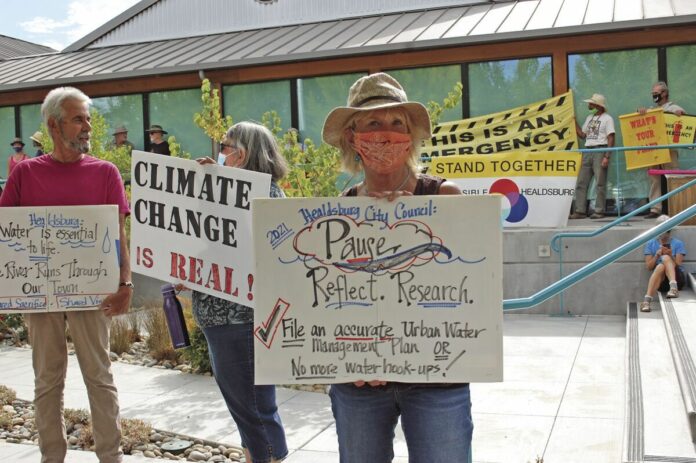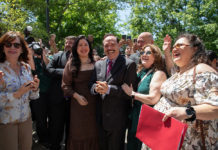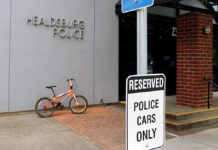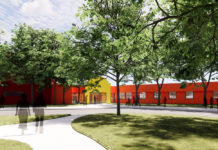Healdsburg residents and local climate activists gathered at City Hall on Aug. 2 to call for further city action to address climate change and the consequent drought that’s drastically altering the Russian River watershed and its water supply.
The demonstration was held just hours after the State Water Resources Control Board announced curtailment orders for all water right holders in the upper Russian River watershed.
The crowd gathered with the intent of making their voices heard during an in-person Healdsburg City Council meeting planned for Monday night, however, due to the sharp rise in COVID-19 cases throughout the county, the city decided late last week to hold the meeting via Zoom.
Despite the change, spirited residents gathered at the steps of City Hall to voice their opinions and make their voice heard above the grumble of passing cars.
Demonstrators held handmade signs with slogans such as, “Climate change is real,” “climate emergency is now,” and “water for residents.”
Attendees also expressed support for calling for a shared sacrifice of water consumption and for the city to take a pause and take a look at its development footprint in regards to water usage and to craft a forward-thinking urban water management plan.
“I think it is important to represent the townspeople’s interest and not necessarily these big developers and people who put in big hotels and expensive condominiums because where are they going to get the water? … You gotta put the brakes on this for a while until we have some water. We don’t have enough water right now, everybody is freaking out about water. I think it is just really important to make our voices heard,” said John Faulkner, a Healdsburg resident who’s lived in the area for about 12 years.
Faulkner isn’t the only one who wants the city to take a break on new development.
Former Healdsburg Mayor Brigette Mansell has been leading the charge on a local petition campaign that calls for the city to pause new development until it can create a strategic and progressive urban water management plan.
The petition text states, “We, the undersigned Healdsburg city residents, business owners, and Healdsburg workers, formally request that the Healdsburg City Council prioritize the water needs of current residents and city businesses. Because the city has declared a local drought emergency, residents and businesses have been directed to vastly restrict water use. We ask the city council to use their emergency powers to immediately postpone all non-essential building until a viable, accurate 2021 Urban Water Management Plan is filed and accepted by the State of California.”
Mansell explained via email that her focus has been about halting water hookups for all non-essential buildings — essential being defined as low-income, below market rate workforce housing.
As the campaign continues to grow, Mansell said the petition has over 200 electronic signatures and 60 more in writing.
She said there’s also a separate petition on Change.org for equitable use of water that will also be sent to the Healdsburg City Council.
While much of the focus of the Monday afternoon protest was on water scarcity, the overarching theme was climate action.
Healdsburg resident Ty Benoit, who lost her home in the 2017 Tubbs Fire, urged the city council to take immediate climate action steps that affect meaningful change.
“I am a recent climate migrant to Healdsburg. I moved here in 2017 after losing my house in the Tubbs Fire in Santa Rosa and I am joining about one billion people across the world who are climate migrants and I appreciate the enthusiasm with which Healdsburg has brought to the movement,” she said.
While there haven’t been any major local wildfires so far this summer, Benoit expressed that it’s still difficult to live with the memories of the Tubbs Fire.
‘It’s hard when you’ve lost your home and lost everything that you know and love. It’s like a grief that can’t really quite be described. I’ve translated my grief into much more climate action, but this is for me a calling right now and I do it because I have a 5-year-old and a 3-year-old grandchild and it is critical for me to think about that generation and think about those children who are inheriting a world that has been in such a state and in Healdsburg we are in Sonoma County at ground zero right now,” Benoit said. “The curtailment order just came in and there will be further curtailments on our water, but it is not just a water emergency. For me and for many of us who are here, it is a climate emergency. It is a much bigger issue than just the water crisis in Healdsburg, but that’s where we start.”
Benoit recalled just a few weeks ago when young climate activist Greta Thunberg addressed political leaders across the world saying they’ve had three years since the Intergovernmental Panel on Climate Change report came out.
Thunberg said while political leaders pretend like they’re acting on change, it’s more like climate acting — acting as in movie acting —instead of real climate action.
“In 2019 we joined the jurisdictions across Sonoma County to pass a climate emergency resolution and then we sort of filed it away,” Benoit said.
She said over the past 15 years the city has also filed three urban water management plans.
“There are things that we have said that we would do that we have not done. There’s data that is missing, because if you read the 2016 urban water management plan it says we are going to be fine — even coming out of that drought we are going to have enough water until 2035 — that was obviously based on faulty data, so we gotta get at it right now,” Benoit said.
According to projections in the 2016 Healdsburg Urban Water Management Plan, in 2035 after a third consecutive dry year, water supply totals would be at approximately 3,861 annual acre feet (AF) and demand levels would be at 3,176 AF.
Benoit said the city needs to start acting with the thinking that climate change is an emergency.
Benoit wants to see Healdsburg create a climate commission and to see a much more robust plan to address the climate emergency.
During the city council meeting later that night, Councilmember Skylaer Palacios asked if the council could start a climate action ad hoc committee and/or plan a town hall to discuss climate change solutions.
Councilmember Ariel Kelly said she’d also like to see climate-related town hall meetings and perhaps one on clean transportation, energy and on solid waste. She’d also like to see the city create a timeframe that the city’s climate emergency resolution and goals can be held to.
“We passed a climate emergency resolution back in 2019 that said let’s try to be carbon neutral as quickly as possible, but without having a goal in mind. I think for the purposes of staff and the different reduction measures that we’re aiming towards, actually having a target is really critical so if we know we’re on track to meet it or not and course correct if need be,” Kelley said.
Healdsburg Mayor Evelyn Mitchell said she supports holding a town hall and to tap into the community and its expertise on climate change solutions and mitigation measures.
Councilmember David Hagele suggested that city staff should come back to council with suggestions on how to format such a meeting and to narrow the focus on what the purpose of the public forum would be. He said he likes the idea of a public forum where residents and the council could have an interactive and productive discussion rather than simply hearing public comments.
Vice Mayor Ozzy Jimenez said that the city needs to start creating actionable items that address climate change in an equitable way.
“Climate change is at our door, if not in our house and so we need to be able to create actionable items within our city to be able to meet that moment,” Jimenez said. “I am an individual that is sometimes sensitive to top-down-level approaches to certain task forces or initiatives that are coming from the city just because I am a firm believer that it needs to be a community driven process. I look forward to this group convening and having a set of priorities come from the community structured around transportation and the need to change our buildings.”











